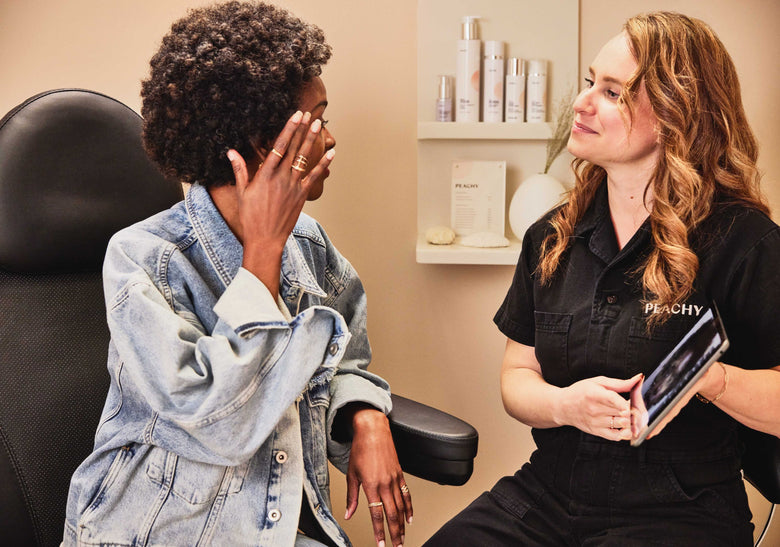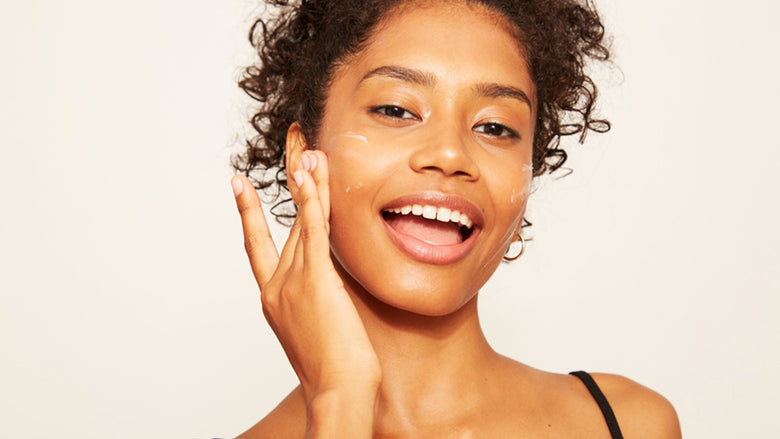Retinoids. They’re one of the most promising ways to build back collagen and diminish wrinkles in turn. But what exactly are retinoids and what does a quality formula look like?
The main event: tretinoin
The term “retinoid” is used to describe vitamin A derivatives – different offshoots – that include both over-the-counter products and prescribed ones.
At Peachy, we use the retinoid tretinoin, a naturally occuring vitamin A derivative. Available only by prescription, tretinoin has been rigorously tested and approved by the FDA. Meaning it’s been found to be both safe and broadly effective at what it does.
Our retinoid treatment works on a cellular level to counter physiological aging and reverse photodamage. It can also help reduce acne while balancing tone and smoothing textured skin. Better yet, there’s a wealth of data backing up the benefits prescribed retinoids bring with consistent use.
What about non-prescription?
If you’ve shopped around for wrinkle care, chances are you’ve crossed paths with another well known vitamin A derivative: retinol. Like retinoids, they come as topicals (serums, creams, lotions, and emollients) which are applied directly to the skin.
A milder subtype of retinoids, retinol is an ingredient found in many over-the-counter skincare products. While retinol can help with cell turnover, it is not FDA-approved for correcting photodamage. Though it is commonly used to treat acne and reduce texturing in skin!
One key difference between retinoids and retinol is clinical strength. The fact is, we don’t have the same breadth of clinical proof for retinols that we do for retinoids, so it’s hard to say how the effects of retinol compare to that of retinoids. Moreover, retinol hasn’t been significantly studied to support widespread success for a variety of skin types and textures.
What we do know: Retinol is 20 times less potent than tretinoin, making prescription retinoids a true at-home wrinkle treatment.
The amplifier: vitamin C
Within our prescription retinoid formula, we’ve included ingredients to amplify the retinoid’s performance. Vitamin C is one of them. A potent antioxidant, this vitamin can prevent changes associated with photoaging, or damage caused by the sun. Vitamin C works in tandem with the tretinoin to reduce the appearance of wrinkles and patchy hyperpigmentation. The end result is smoother skin in both texture and tone!
The soothers: hyaluronic acid and niacinamide
Retinoids work by promoting cell turnover. As a result, some may experience skin irritation, redness, and flakiness. This is especially common for users who are new to retinoids, which is why our formula includes ingredients, like hyaluronic acid and niacinamide, that soothe and replenish skin.Dosing responsively is a big part of how we do care at Peachy. The concentration we recommend will depend on your individual skin type and whether you’ve used retinoids or retinols in the past. That way we can find the ideal balance between effectiveness, suitability, and comfort for your skin.
Skincare Takeaways
The right ingredients are ones well known to promote collagen production and cell growth that lead to finer lines – starting with prescription retinoids.Other essentials that help repair and improve complexion:
Vitamin C – A potent antioxidant that prevents common photoaging effects like freckles, liver spots, and hyperpigmentation.
Hyaluronic Acid – Raises your skin's hydration levels by better retaining water and keeping the skin moist.
Niacinamide – Known as vitamin B3, niacinamide repairs the skin’s barrier and protects against photodamage. When it comes to treating and preventing wrinkles, retinoids perform better than retinol – for collagen production, for enhanced skin function, for all of the reasons mentioned above.
Retinoids work for fine lines at any stage! Whether you have dynamic wrinkles or static ones, retinoids promote collagen production while also countering photodamage and natural aging in skin.
At Peachy, we believe sound solutions guide quality outcomes. Prescription retinoids work with your skin to give wrinkles less definition, going where less concentrated treatments cannot.
If you’d like to know more on how retinoids lead to fewer and less noticeable lines, come to one of our studios. We’d love to see your face!
Consults are complimentary at Peachy, and you’ll speak with a board-certified provider focused exclusively on wrinkle treatment and prevention.
Citations
Hubbard, B. A., Unger, J. G., & Rohrich, R. J. Reversal of skin aging with topical retinoids. Plast Reconstr Surg, 2014 Apr; 133(4):481e-90e. doi: 10.1097/PRS.0000000000000043
Serri, R., & Iorizzo, M. Cosmeceuticals: focus on topical retinoids in photoaging. Clin Dermatol. 2008 Nov-Dec; 26(6): 633-5. doi: 10.1016/j.clindermatol.2007.09.016.
Boswell, C. Skincare science: Update on topical retinoids. Aesthet Surg J. 2006 Mar-Apr;26(2):233-9. doi: 10.1016/j.asj.2006.02.003.
Kang S, Duell EA, Fisher GJ, et al. Application of retinol to human skin in vivo induces epidermal hyperplasia and cellular retinoid binding proteins characteristic of retinoic acid but without measurable retinoic acid levels or irritation. J Invest Dermatol. 1995 Oct;105(4):549-56. doi:10.1111/1523-1747.ep12323445
Chiu, A., & Kimball, A. B.Topical vitamins, minerals and botanical ingredients as modulators of environmental and chronological skin damage. Br J Dermatol. 2003 Oct;149(4):681-91. doi:10.1046/j.1365-2133.2003.05540.x
Manela-Azulay, M., & Bagatin, E. Cosmeceuticals vitamins. Clin Dermatol. 2009 Sep-Oct; 27(5):469-74. doi: 10.1016/j.clindermatol.2009.05.010.
Papakonstantinou, E., Roth, M., & Karakiulakis, G. Hyaluronic acid: A key molecule in skin aging. Dermatoendocrinol. 2012 Jul 1;4(3):253-8. doi: 10.4161/derm.21923.




